

Stream Recruiting Black Men to Lead in the Classroom by EdSurge Podcast. WPLN News - Nashville Public Radio. Episode 160: An AsianCrit Perspective on U.S. History with Sohyun An – Visions of Education. In episode 160, Dan and Michael chat with Sohyun An about her new Social Education article titled, “First Graders’ Inquiry into Multicolored Stories of School (De)Segregation” by Sohyun An.

Transcript (to be added) Books, Articles and Other Amazing Resources Biography. This American Life: How to Win Friends and Influence White People - The story of integration at one elite Virgina prep school in the 1960s. Strange Fruit: Teaching Black Students Within Racist School Systems. Our celebration of Black History Month continues and we begin by speaking with Baltimore-area educator Brittany Willis about the perilous plight of Black youth in the American education system — and how she came to realize that in order to save Black children she had to stop being their teacher.
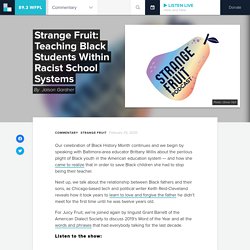
Next up, we talk about the relationship between Black fathers and their sons, as Chicago-based tech and political writer Keith Reid-Cleveland reveals how it took years to learn to love and forgive the father he didn’t meet for the first time until he was twelve years old. For Juicy Fruit, we’re joined again by linguist Grant Barrett of the American Dialect Society to discuss 2019’s Word of the Year and all the words and phrases that had everybody talking for the last decade. Listen to the show: Follow the podcast: Schools In: How can children develop skills to be more resilient? - This looks at how students can be taught strategies for controlling their emotions and actions. How can children develop skills to be more resilient?
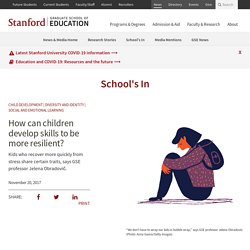
Could singing, dancing and playing peekaboo help kids learn to recover from challenging experiences? Absolutely, according to Jelena Obradović, an associate professor at Stanford Graduate School of Education and director of the Stanford Project on Adaption and Resilience in Kids (SPARK). In this episode of School’s In, Obradović joined GSE Dean Dan Schwartz and Senior Lecturer Denise Pope to talk about how early experiences shape children’s sensitivity and how those who are especially sensitive to stress and negative experiences can become more resilient. Playful activities can teach kids how to manage their emotions and behaviors, she said, which is key to building the capacity to recover from stress. “We often want kids to behave in a certain way in the context of them acting out, showing anger or whatnot,” she said. Schools In: Losing Sleep - This episode is an overview of the importance of sleep for healthy students and the debate over school start times.
Animals have evolved to adapt to their environment in many ways, but one thing hasn’t changed: They all need sleep to survive, says Rafael Pelayo, a clinical professor of psychiatry and behavioral sciences at the Stanford Center for Sleep Sciences and Medicine.
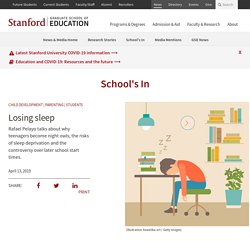
“Anything that has a brain needs to sleep,” Pelayo says. Some animals, like dolphins and migrating birds, stay in motion with one half of their brain asleep while the other half stays alert. But the restorative function of sleep is essential. Schools In: The Reading Wars, Explained - An overview of the debate between "phonics" based instruction and "whole language" instruction. The reading wars, explained When it comes to teaching kids to read, what’s more effective: putting together vocabulary lists or immersing them in a world of language?
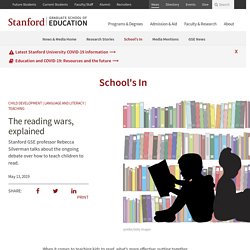
“You would think that for something like reading, which has been studied for a very long time, we would have the answers,” said Rebecca Silverman, an associate professor at Stanford Graduate School of Education, who studies literacy and reading development among pre-K and elementary school children. Schools In - Changing the way schools teach science: Discussion about the current changes K-12 Science instruction is undergoing with an emphasis on teaching students to analyze and interpret data. Changing the way schools teach science Jonathan Osborne, professor emeritus of science education at Stanford Graduate School of Education, had a hand in many of the changes in the way kids learn science today.
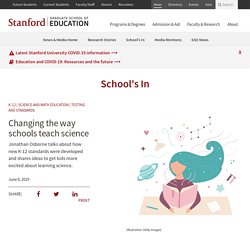
As an author of the Next Generation Science Standards for K-12 schools nationwide, the former science teacher and scientist sought to create guidelines based less on measuring what students know and more on encouraging them to analyze and interpret data, construct an explanation and argue from evidence. Schools In: The job of a school superintendent - A discussion with a school superintendent about their job responsibilities and how they interact with school boards and parents. The job of a school superintendent In school districts across America, superintendents are the face of the district—essentially CEOs accountable to the school board for a district’s successes and failures.
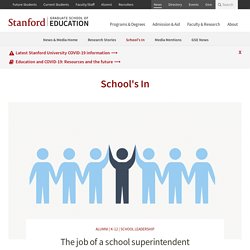
It’s a tough job that demands a very unique set of skills. “My job entails keeping students safe, making sure learning is rigorous and aligned to state expectations, and ensuring that we have the best and brightest educators in front of our kids,” said Erik Burmeister, MA ’97, superintendent of Menlo Park City School District. Schools In: Helping kids identify as math learners - Disucssion about how we can encourage young people to believe in their ability to learn math so they do not become discouraged and give up. Helping kids identify as math learners In a traditional mathematics classroom, the teacher is the ultimate authority, issuing directives and creating class rules for participation and behavior.
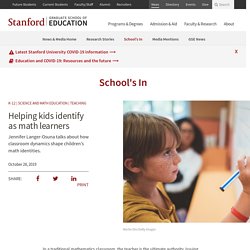
But in some math classrooms, the teacher shares authority with students, encouraging them to explore problems, come up with their own solutions, and evaluate work in collaboration with their peers. Schools In: Teaching difficult histories - Discussion about how to talk about past injustices and a look at how we can build culturally inclusive curriculum. Teaching difficult histories Social studies and civics teachers should be discussing difficult topics like inequality, prejudice and racism with their students—but many aren’t because they feel uncomfortable, don’t have the curricular resources or haven’t been prepared to do this type of heavy lifting in the classroom, says Michael Hines, a historian of education and assistant professor at Stanford Graduate School of Education (GSE).
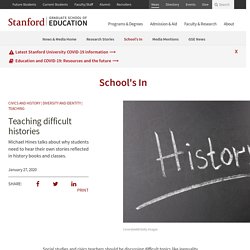
“There’s a challenge that teachers have to face about learning to be comfortable teaching uncomfortable topics,” says Hines. “That’s something we need to work on as educators, as parents, as students: being comfortable sitting in that place of discomfort. It’s a lot easier to open up a canned curriculum, have the answers right there and just be able to move on.”
Schools In: Teaching kids to make sense of data - Discussion about how we can get kids more interested in Statistics by using data relative to their lives and interests. Teaching kids to make sense of data Understanding how to work with data not only opens the door to opportunities in a changing workforce—it’s also critical to being an informed citizen, says Victor Lee, an associate professor at Stanford Graduate School of Education (GSE).
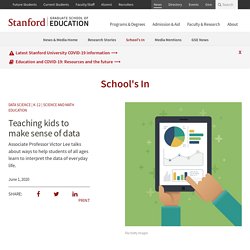
Take election polling: Knowing what the numbers really mean involves important considerations that news coverage may not address, Lee says. “How trustworthy is the data? Is it measuring the thing it’s supposed to be about? Schools In: Moving toward a ‘community school’ model - Researcher Milbrey McLaughlin gives her definition of "community shcool" and argues for why its necessary in today's world. Moving toward a ‘community school’ model The COVID-19 crisis has made it clear that schools offer much more than learning, with many families struggling to offset the sudden loss of support for meals, child care and other services. As districts explore ways to support students through the economically uncertain times ahead, some are looking to the “community school” model: an approach that integrates health and medical care, social services, mentoring and other resources with academics in K-12 schools. Schools In: Creating more inclusive schools. Creating more inclusive schools Amid growing awareness of long-entrenched racism in the United States, many schools are taking steps to create a more inclusive environment.
But it’s unrealistic to aim for a scenario where students and teachers get everything right, says Eric Abrams, chief inclusion officer at Stanford Graduate School of Education (GSE). “We all make mistakes,” he says. “It's impossible for any of us to understand every single nuance of every culture, every faith, every sexual orientation, every ability status that exists in the world.” On this episode of School’s In, Abrams joins GSE Dean Dan Schwartz and Senior Lecturer Denise Pope to talk about what a more inclusive school or campus can look like and how to move toward that vision, including ways to help kids learn to fight racism in their own communities.
Ted Radio Hour: Teaching For Better Humans 2.0 - Discussions about how we can identify and teach to the needs of 21st century citizens. Mindshift: How Students Would Improve Their School Lunch Experience - Discussion with students and teachers about how school lunch can be re imagined. And then there’s the matter of getting a good spot at a table inside the bustling cafeteria. “Sometimes you might worry that you might not get a spot,” said Gonzalez. “You might get pushed to the edge or sit at a different table than you would like because of the fact that you have to wait in line, and then it takes a lot more time to get ready and sit down with your friends.”
Mindshift: Childhood As ‘Resume Building’: Why Play Needs A Comeback - Tracks the history of shrinking "play time" for children and makes an argument for why free time for children is more important than ever. Listen and subscribe to our podcast from your mobile device:via Apple Podcasts | via Stitcher | via NPROne | via Spotify | Transcript “Why is it that we don’t go outside as much as my parents did as children?” This sixth-grader’s question caught teacher Kath Irving off-guard. Mindshift: How Can Schools Help Kids With Anxiety? - Chronicles the increasing prevalence of anxiety disorders among adolescents and discusses how parents and teachers can help. Brianna is just one of many young people around the country experiencing anxiety, and often the depression that comes with it. Teachers and parents all over the country are noticing an increase in mental health issues, including anxiety, among students. There isn't much research directly surveying adolescents on their anxiety.
In 2004, the National Institute of Mental Health estimated that about a third of adolescents (ages 13-18) have been or will be seriously affected by anxiety in their lifetimes. More recently, a study published in the Journal of Developmental and Behavioral Pediatrics, based on parent surveys for the National Survey of Children’s Health, concluded that more than one in twenty U.S. children (ages 6-17) had anxiety or depression in 2011-2012.
Mindshift: How Teachers Designed a School Centered On Caring Relationships - Story of one L.A. School that has emphasized building strong relationships and the positive outcomes that has led to for students. Mindshift: Why Ninth Grade Can Be a Big Shock For High School Students - Episode about the trouble many freshman face navigating high school and the story of how one school is using cohorts as a solution. Mindshift: Courage To Change: What It Takes to Shift to Restorative Discipline - Overview of what Restorative discpline is and profile of how some KIPP schools have adopted it. Mindshift: How Listening to Podcasts Helps Students Read and Learn. Mindshift: Be The Change You Want To See - Profile of one school that adopted a multigrade interdisciplinary program that blends science, technology and english into a curriculum heavy in project based learning and self assessment.
Profile of one school which adopted restorative disciplinary practices but found it too much for individual classroom teachers to manage on their own. Nice White Parents: A five part look at the way social power is wielded in one Brooklyn school undergoing rapid demographic changes. Co-production between Serial and NYT. Episode One: The Book of Statuses. Nice White Parents: How White Progressives Undermine School Integration [Transcript] BBC World Service : Brown v the Board of Education - Overview of the landmark decision and it's lasting implications. Vouching Towards Bethlehem.